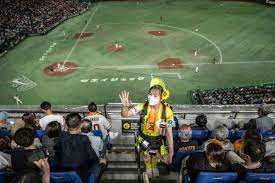‘Uriko’ Beer Vendors of Japanese Baseball: Speed Demons
At the Tokyo Dome baseball stadium in Japan, an army of ladies in bright costumes sprint past cheering spectators while toting cumbersome backpacks with connected spray guns. These are the “uriko,” or beer merchants, who are as distinctive to Japanese baseball as the fan bases who pump up their squads with drums and horns.
Like the cheerleaders who tumble onto the field between innings, this custom, which is almost entirely comprised of young women wearing miniskirts or shorts, may seem antiquated to some.
Women in Japan have recently questioned everything from wearing high heels to work to customs requiring them to offer tea to coworkers as part of the country’s own #MeToo movement.
But the uriko continue to be a fan favorite among those who participate in Japan’s most popular sport, which draws a wide range of men and women as well as a lot of families.
Honoka Hagiwara claimed she was drawn to the job’s “glamorous” reputation since she had to carry kegs weighing up to 15 kg for upwards of three hours at a time on her back.
“I’ve been doing it for just over a year now and I’ve gotten much more used to it,” the 22-year-old told AFP.
She acknowledges that it was “physically very tough” at first, but she now likes the very competitive profession, where there are over 100 opponents working any given game.
At a night game at Tokyo Dome, the Yomiuri Giants’ home field, beer sellers typically sell about 20,000 cups of the beverage.
Despite some males working at other stadiums in Japan, all of the stadium’s vendors are women.
The majority of sellers were males who strolled around stadiums selling alcohol on flat tables hung over their necks until the 1980s, when it started to go the other way.
The position is still available, according to Tokyo Dome.
A spokesman told AFP that there isn’t and won’t be anything in the way of males getting jobs.
However, “around 100 times more” women than males apply, “so the result is that there are no men.”
Aware of sales
According to Uriko Mariko Matsumoto, she has cultivated relationships with regulars and likes communicating with fans.
The 25-year-old said she handles her clients the same way she would like to be treated by gaming merchants.
“I enjoy attending baseball games, and seeing a vendor grinning encourages me to buy a drink.”
However, not every vendor views the task with same enthusiasm.
On a blog run by the Asahi Shimbun newspaper, a former uriko characterized the position as “creepy, creepy, creepy.”
The author complained of clients requesting to snap her picture and offering her unwanted business cards with their contact information. “It didn’t take me long to realise that I wasn’t only selling beer and snacks — I was selling myself,” she added.
Security is on duty in case inebriated fans go out of line, although disturbance is uncommon at Japanese baseball games, which are often enjoyed as a family outing.
Sales, according to Matsumoto, are her first priority, and she is “always thinking” about her numbers.
You are thinking about your own figures and attempting to sell more than you did the day before, she added, while simultaneously keeping an eye on how much the others have sold.
Pit halts
Although Hagiwara stresses that not making the client wait is the “top priority,” commission-based remuneration implies that working quickly pays.
Although it is forbidden for vendors to sprint in the bleachers or on the stadium concourse, it is common to observe them doing so as they rush from client to consumer.
With their vividly colored outfits and plastic flowers in their hair, hidden by wide-brimmed hats, they are simple to identify.
Since they must stoop when serving to prevent obscuring the view, some wear knee protectors.
With a pace that would put some Formula One pit stops to shame, they switch out kegs around 10 or 12 times a night.
Vendors barely have time for a sip of cold tea while support employees pull out the empty keg and replace it with a fresh one; sitting down for a break is out of the question.
More guys should attempt the profession, according to vendor Hagiwara, but not everyone at Tokyo Dome agreed.
“A man? While watching the game with a buddy, 64-year-old Sachiko Shibuya commented, “I’ve never thought about it.
Yoshie Eki, 59, claimed she didn’t care who served the beverages since it didn’t upset her.
“I’ll buy beer if I’m going to the ballpark; it puts you in the mood more.”







